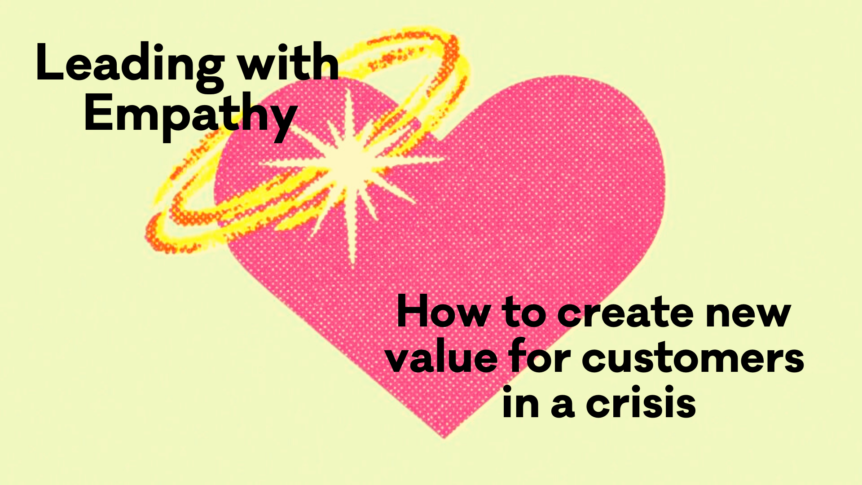This article was first published in mycustomer.com
COVID-19 has brought upon us frenetic change. Around the world, people have bunkered down. Our homes are now isolated and have become digital eco-systems for living, working and socialising. Our experiences at this time won’t be forgotten. How well organisations respond, or not, will be remembered.
With our emotional and physical wellbeing balancing on a knife edge—we now exist in a heightened emotional state. Emotions act like a highlighter, emphasising the memorable aspects of our experiences. These are the experiences we remember and the experiences that will influence future behaviour.
In survival mode
Businesses too are in survival mode. Their primary focus has become getting and staying operational. In this current state of flux, too many have forgotten the customers and employees they serve; responding to their needs with low concern.
One example is the pro forma email I received from my health insurance company advising, without acknowledging the crisis or customer concern for its impact, that ‘your next installment is due …. please ensure you have the funds available to pay.’
Or the phone call my mother-in-law received from a pest control company wanting to undertake an annual inspection. When she politely declined due to current social distancing protocols, they told her that COVID-19 was being spread by rats and mice.
Conversely, there are companies acting with courage and leading with empathy. Putting their employees’ and customers’ wellbeing at the heart of their decisions; making peoples’ lives safe is their new priority. These are future facing actions that will build long term, loyal, customer and employee relationships.
Empathy enables us to connect human to human. When we’re empathetic we are open to understanding another person’s point of view, feeling what they’re experiencing and considering this in our decisions.
Empathy in leadership
As New Zealand mourned in the aftermath of a terrorist attack, Prime Minister Jacinda Ardern’s words, “they are us”, brought everyone together as one; united in universal human values.
In an unprecedented action, Ardern responded with empathetic concern. She demonstrated understanding, compassion and solidarity with New Zealand’s Muslim community. Her actions showed the world, that being empathetic is a powerful leadership quality.
She exuded the human traits seldom seen in leaders today. Qualities that are defining a different type of leadership, one of optimism, inclusion, equality, communication openness and most of all, empathy.
They’re leading with empathy
Australian grocery retailer Harris Farm’s response to the current crisis demonstrates leading with empathy. I was impressed by their Chairman, Catherine Harris’s corona-crisis communication style when I saw her interviewed on national TV. In the midst of consumer panic buying, she reinforced with calmness and certainty that, “we have a very good supply of fruit, vegetables and groceries … 96% of groceries come from within Australia.”
In times of crisis and uncertainty a leader’s communication needs to be contextual and compassionate as well as informative. Above all, businesses must deliver what’s promised. As reported in the Australian Financial Review, Harris Farm’s promise of uninterrupted fresh food supply continues to be consistently delivered instore, by running their warehouse 24 hours a day and increasing their workforce by 20% to manage surges customer purchasing.
What sets them apart
What has set Harris Farm apart from other businesses, is their human response to the crisis; their empathy for customers and employees. Every interaction, from their communications through to their instore customer experience and employee welfare has ‘safety’ stamped on it; designed with customer and employee wellbeing in mind.
Safety isn’t just physical protection from harm. Feeling safe also includes being supported emotionally, psychologically and physically too. In customer experience management, organisational focus begins with delivering the customer expectation basics of, ‘easy to understand, easy to use and easy to access.’ In this time of uncertainly, safety represents ‘new value’ and has quickly become the fourth customer expectation.
Early examples of Harris Farm’s safety in action included a rapid response to minimising the spread of the coronavirus using the standard anti-bacterial wipes and installing mobile wash basins with running water, soap and clear usage instructions at the entrance to and within their retail stores.
Co-Chief Executive Tristan Harris commented in an interview with the Australian Financial Review, ”At a time when it was not clear Australia would be hit hard by the virus, Harris started buying three months’ worth of hand sanitiser and 200,000 masks at $2 each.“
Protecting customers and employees
They are now protecting employees and customers through the installation of perspex screens on cash registers. Cleaners are employed to sanitise registers every hour and they have moved quickly to change company policy on cash transactions from customers. Additionally, all employees have been offered a flu vaccination paid for by the company. Harris Farm’s actions send a clear safety message; your wellbeing is important to us.
Tristan Harris continued, “We needed to give our staff a level of comfort … If they stopped coming to work we didn’t have a business.”
Even their concern for the wider community demonstrates empathy in action. My local Harris Farm store sits within a small shopping mall; most of the retailers there are family run businesses and like many others, have been financially impacted by the huge downturn in patronage. However, one of the cafés is being supported by Harris Farm purchasing employee meal break snacks and drinks.
Experiences are inherently human and how we feel is what we remember–these key moments in our lives shape our future attitudes and behaviour. In these emotionally charged times, actions that make a difference in peoples’ lives have never been more critical. Leading with empathy, understanding peoples’ needs and responding with compassion will be remembered warmly and rewarded well after this crisis passes.

